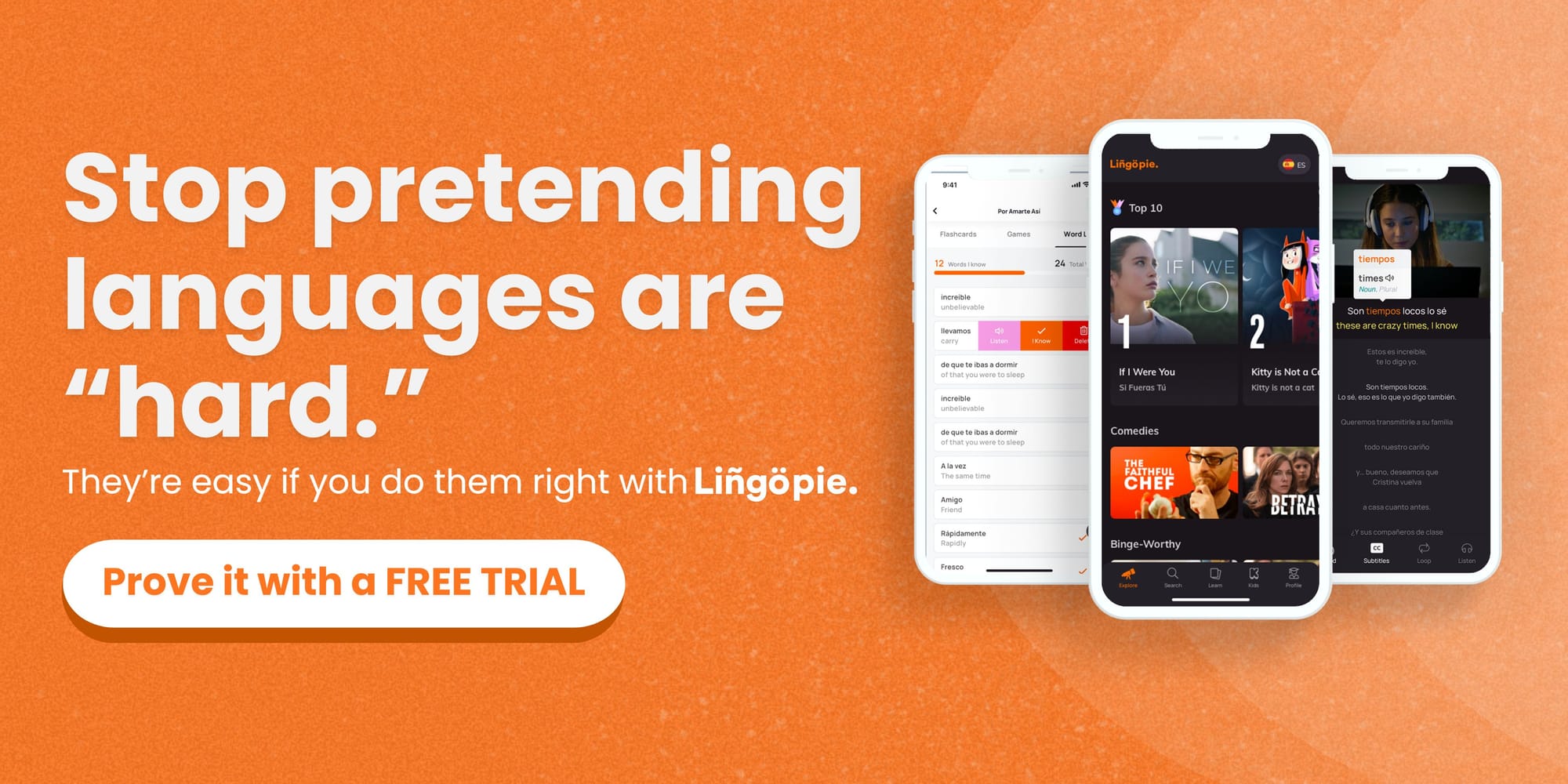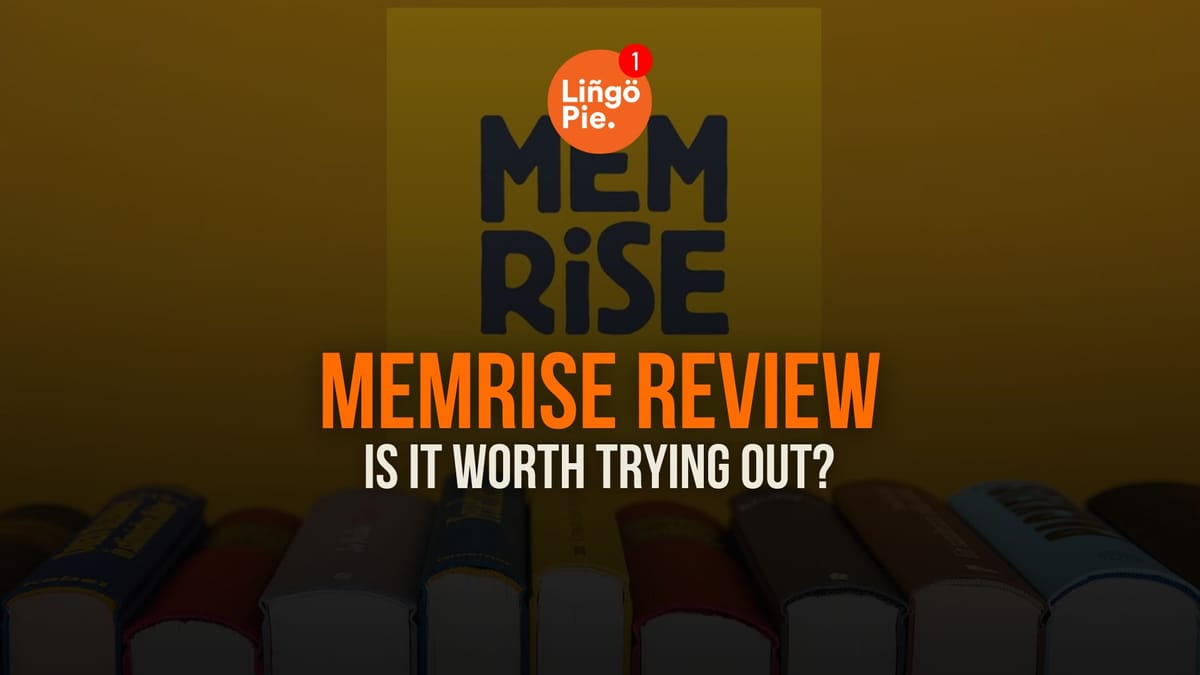Learning a language today is infinitely easier than even five years ago. You’ve got AI tutors available 24/7, thousands of free PDFs floating around, Anki decks, and entire university courses available for free on YouTube. The options are almost overwhelming, so sometimes you just want something simple and focused.
That's exactly what brought me to Memrise.
While other language apps try to do everything, this language learning platform promises a straightforward approach: vocabulary through spaced repetition. That’s it! But...if that’s all it has to offer, do u think it’s worth it?
In this post, I'll walk you through everything from the free features to Pro, cover what languages are available, and help you decide if Memrise courses fit your learning style. Whether you’re curious about Memrise cost, wondering "is Memrise free" for basic use, or considering a Memrise lifetime deal, I’ve got you covered.
- LingQ Review: Is It Actually Good For Learning?
- Language Transfer Review: Strong Foundation but Can’t Replace Real Immersion
- Tandem Review: We Tested the App Everyone’s Comparing to Tinder

What Is Memrise?
Memrise is a British language platform built around spaced repetition flashcards to help you learn vocabulary faster. The company started with languages and has since expanded to user-generated content covering history, science, and other subjects. The core concept remains simple: show you Memrise flashcards at calculated intervals so words stick in your long-term memory.
After spending weeks with the platform as someone who works in the language learning space, I’ll be straight with you—Memrise excels at vocabulary building through repetition. The Memrise app reminded me why some learners prefer focused tools over comprehensive platforms. You won’t find game-heavy quizzes, technical grammar lessons, or immersive video content here.
How Does Memrise Work?

Memrise takes a vocabulary-first approach to language learning. Once you’re inside the platform, you can select your target language and jump into "scenarios" to start learning. From there, you have two main paths: follow the recommended course that covers practical situations like greetings, reacting to danger, and survival questions, or get more specific by choosing courses focused on particular topics like activities, basics, school, food, and health.
In my case, since I was testing Memrise Japanese, I started with the fundamental hiragana and katakana lessons to build my foundation. After using it consistently for the last 31 days, I realized that the whole experience really centers around flashcard-style repetition. That said, I don't see it helping me learn beyond basic vocab and pronunciation. It doesn’t really have in-depth lessons on grammar, which is a skill I badly needed to learn.
What I Liked About Memrise
Native Speaker Content

One major plus point for Memrise is that it puts real native speakers front and center in their learning experience. This means that you'll hear a variety of voices with different accents, tones, and speaking speeds. Each word or phrase is recorded by multiple native speakers, which brings your lessons closer to real conversations.
Most flashcards are also video-based, showing actual people speaking or writing instead of static images or robotic audio. When learning languages with different writing systems (like Japanese in my case), you’ll also see different handwriting styles, helping you recognise how real people write.
For me, this approach builds stronger recall. You get to learn to understand words in new contexts rather than memorising patterns (like in Duolingo). The range of speakers and formats helps you adapt, just like you would in everyday situations.
Memrise also keeps things varied with different flashcard styles. Sometimes you match audio to a character, other times you match meaning to a word. These shifts keep you focused and reinforce your memory in more than one way.
Personalized Lessons

Memrise adapts to your learning pace and performance through its spaced repetition algorithm. During my month of testing, I noticed that Japanese characters I kept mixing up would resurface multiple times within a session until I got them right consistently. Meanwhile, words I picked up quickly would fade into the background, only reappearing after several days for reinforcement.
The approach feels efficient since you’re not wasting time drilling words you already know well, and you’re getting extra practice on your weak spots. It’s a simple concept, but Memrise executes it smoothly enough that the personalization feels natural rather than algorithmic.
MemBot

I appreciate what Memrise is trying to achieve with MemBot, especially for learners who feel anxious about speaking. The concept of having an AI partner available 24/7 for conversation practice addresses a real gap in language learning apps. The AI can provide hints, translations, and suggested responses when you get stuck, positioning itself as a safe space to practice before real-world conversations.
During my testing, MemBot felt responsive, and the conversations were more natural than I expected from an AI chatbot. The ability to steer conversations in different directions and get instant feedback could be valuable for building confidence.
However, the feature still feels like an add-on rather than a core part of the Memrise experience. While it’s a step toward more comprehensive language learning, it doesn’t quite transform Memrise from a vocabulary-focused platform into a full conversation training tool.
What Should Be Improved
No Holistic Skills Training

While you'll build a decent word bank through their spaced repetition system, the platform doesn't offer meaningful grammar instruction, reading comprehension exercises, or writing practice. You won't find lessons on sentence structure, verb conjugations, or how actually to construct coherent paragraphs in your target language.
Not For Advanced Learners

We love SRS (spaced repetition system) platforms, and apps like Memrise are superb tools for language learners who need to build vocabulary efficiently. However, with that strength comes inherent repetition. While that’s the whole point of spaced repetition, it can get dull fast—the same flashcards, the same format, over and over.
If you're someone who needs variety to stay motivated, or if you've moved beyond the beginner stage, Memrise's approach starts to feel limiting pretty quickly.
The bigger issue is the lack of holistic language training. Sure, you can learn to write the alphabet, pick up new words and phrases, and train your ear with native speaker audio. However, there simply aren't enough sections for grammar instruction, reading comprehension of extended sentences, or complex language structures that intermediate and advanced learners need.
Memrise sure does excel at helping you memorize individual words and basic phrases, but it won't teach you how to construct sophisticated sentences, understand nuanced grammar rules, or work through longer texts.
Questionable User-Generated Courses

One of Memrise's biggest selling points—its extensive library of user-generated content—is also one of its most problematic features. These community courses are hosted on a separate site outside the main app, which creates a fragmented experience within the Memrise universe.
Here, anyone with an account can create and publish courses, and here’s the issue: there's no verification or quality control from the Memrise team. You’re essentially learning from random internet users with no credentials or oversight.
The more I explored these user-generated Memrise courses, the more the platform reminded me of Quizlet...and that’s concerning when you’re trying to learn a language accurately. Who knows if what you're memorizing is actually correct? I found courses with questionable translations, outdated information, and sometimes outright errors.
Memrise Review: Yay Or Nay?
Verdict: Yay, but with conditions.
Memrise succeeds at what it promises to do: help you memorize vocabulary efficiently through spaced repetition. If you’re a beginner who needs to build a solid word foundation in languages like Japanese, French, or Korean, the platform delivers. The native speaker content is genuinely valuable, the personalized learning algorithm works well, and MemBot adds a decent conversation practice element.
However, calling it a complete language learning solution would be misleading. The platform has clear limitations: questionable user-generated content, lack of grammar instruction, and minimal holistic skills training. It won't teach you to read complex texts, write coherently, speak confidently, or understand nuanced grammar rules.
If you understand these boundaries and use Memrise as part of a broader learning strategy, it can be quite effective. Just don't expect it to take you from beginner to fluent on its own.
Memrise Vs Other Apps
Memrise VS Lingopie

Lingopie takes the win here because it offers something Memrise fundamentally lacks: immersive, contextual learning through real TV shows and movies. While Memrise excels at vocabulary memorization through flashcards, Lingopie lets you learn language as it's actually used in authentic content with native speakers in natural contexts. You get exposure to cultural nuances, slang, and conversational patterns that flashcard-based learning simply can't provide.
Lingopie's approach is far more comprehensive and engaging for learners who want to understand how language works in real-world situations rather than just memorizing isolated words.
Memrise VS Duolingo

While Duolingo relies heavily on computer-generated voices and artificial scenarios, Memrise features real people speaking naturally with different accents and speaking styles. This exposure to authentic pronunciation and varied vocal patterns gives you a much better foundation for understanding real conversations. Duolingo's gamified approach might be more entertaining, but Memrise's focus on actual native speaker audio and video content provides more practical value for developing listening skills and pronunciation.
Memrise VS Babbel

Babbel comes out ahead because it offers structured, comprehensive language courses with proper grammar instruction and contextual learning. While Memrise focuses almost exclusively on vocabulary memorization, Babbel provides complete lessons that teach you how language actually works, covering grammar rules, sentence construction, and practical conversation skills.
Babbel's courses are also professionally designed and follow a logical progression that takes you from beginner to intermediate levels. So for anyone who wants a well-rounded language education rather than just vocabulary drilling, Babbel's holistic approach is significantly more effective.
So, What's Next?
After thoroughly testing Memrise, I can confidently say it's a capable vocabulary-building tool that serves its purpose well. The native speaker content, spaced repetition system, and clean interface make it effective for memorizing words and basic phrases. However, like most flashcard-based platforms, Memrise has clear limitations.
This is exactly why we built Lingopie differently. Instead of drilling isolated vocabulary, you learn through authentic TV shows and movies where language comes alive with natural conversations, cultural nuances, and real-world context. You'll absorb vocabulary, grammar, and pronunciation simultaneously while actually enjoying what you're watching.
If you're ready to move beyond flashcards and experience how free and discover what immersive learning can do for your fluency.





![How To Learn Portuguese Fast? [Best Guide]](/blog/content/images/size/w1200/2024/08/Lingopie-2.png)



![7 Best Apps To Learn German On Your Own [REVIEWED]](/blog/content/images/size/w300/2026/01/best-apps-to-learn-german-on-your-own.png)